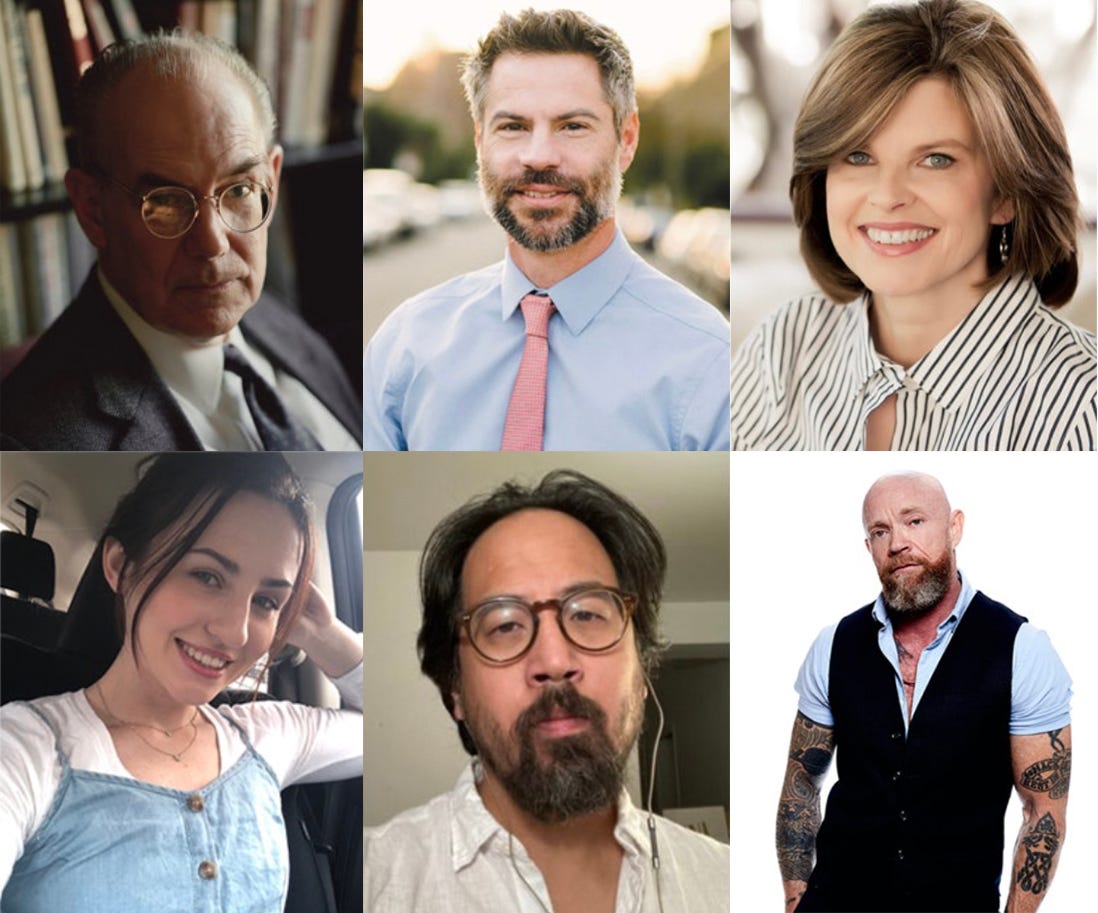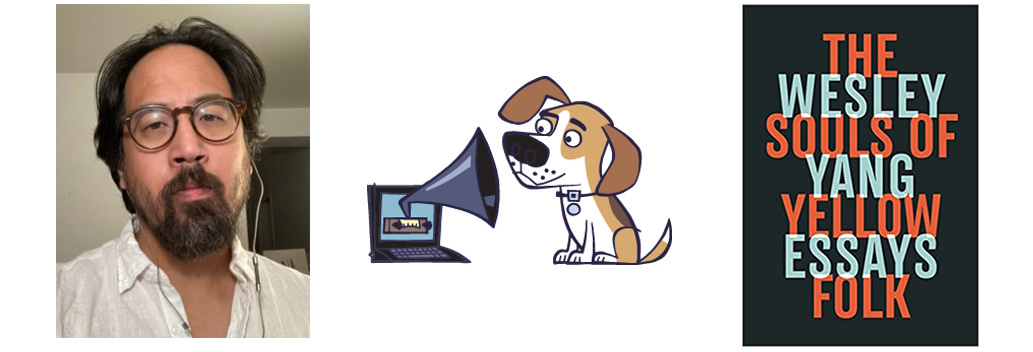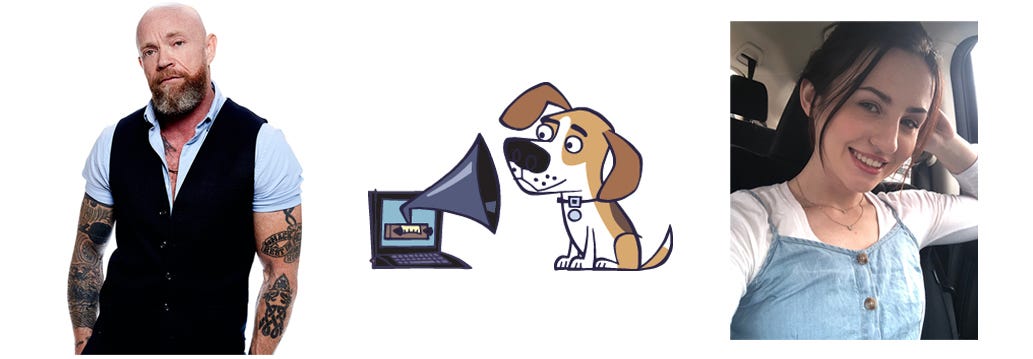New Transcripts: Yang, Flanagan, Buck & Helena
Wesley Yang, Caitlin Flanagan, Buck Angel, and Helena Kerschner join Michael Shellenberger and John Mearsheimer in our growing collection of pod transcripts.
Yes! You asked for them and we’ve been able to put them together for a handful of classic episodes, with many more to come (e.g. Cornel West, Jon Rauch, Julie Bindel, Glenn Greenwald, Briahna Joy Gray, John McWhorter). Below you can find overviews and links for my long conversation with Wesley Yang on the successor ideology; my Christmas reflections on mortality and faith with the great and powerful cancer survivor, Caitlin Flanagan; a swash-buckling, non-woke three-way with transman Buck Angel and detransitioner, Helena Kerschner; a pellucid realist case for a neutral Ukraine from John Mearsheimer; and Michael Shellenberger on urban collapse, homelessness, and addiction.
Speaking of which, below we also have dissents and other responses to our latest episode with Maia Szalavitz — who made a direct counter-case to Shellenberger on drugs and harm reduction. More and more, I’m trying to use the Dishcast to air out difficult topics, host different perspectives, and push back on everyone, so that the best arguments prevail. I’m not trying to win an argument every time — losing one can be just as instructive. What we’re trying to do here is model a genuinely pluralist media, which is what liberal democracy desperately needs. So grateful, as ever, for your making this possible.
Wesley Yang is a columnist for Tablet magazine, the author of The Souls of Yellow Folk, and an indispensable Substacker. I’ve long admired him both for his essays and for his dry-as-toast Twitter feed. In this episode, we discuss the Great Awokening and critical race theory in great detail. You’ve be warned.
The episode aired on July 30, 2021. Read the whole transcript here. It’s an especially long conversation but well worth your time — in fact, it’s the second-most downloaded episode on the Dishcast, behind John McWhorter’s. Some money quotes from Wes:
“We claim to be attacking whiteness and white supremacy, when actually we're taking away things from a non-white immigrant group.”
“There’s such an expansive definition of the term ‘white supremacy’ — it refers to the Christchurch killer, and it refers to shades of mascara.”
“During the summer of 2019 — and this was the ‘babies in cages’ period — there were a handful of polls showing that an absolute majority of Hispanics approved of Donald Trump.”
“African-American culture may be the dominant strand of America’s soft power in the rest of the world.”
“Kendi-DiAngeloism and MacKinnonism saw that if they wanted to squeeze more ‘gains’ for oppressed groups, they would have to cannibalize the values of free speech and due process.”
Buck Angel was a pioneering porn star — the only trans man to ever win Transsexual Performer of the Year at the AVN Awards — and today he’s a sex educator, motivational speaker, and entrepreneur. Helena Kerschner is a 22-year-old woman who lived as a man on hormone therapy for several years before detransitioning. Buck’s transition saved his life, while Helena’s transition was a bit of a calamity, but they share a resistance to the dogma of the trans activist community and speak forcefully and elegantly against it.
The Buck and Helena episode aired on April 16, 2021. Read the whole transcript here. Some money quotes:
Helena: “I truly think that this is one of the defining issues of our moment in time. Because truly, children are being hurt.”
Helena: “I got into a relationship with her and I was attracted to her, but I don't think I would have been able to be intimate with her if not for the testosterone.”
Buck: “Back then in the '70s, they made us all say we're just gay. Today they're flipping it: ‘Well, you're not a gay woman, you're definitely trans.’”
Buck: “We had to have notes from therapists, which now they call gatekeeping — that’s ridiculous. I call it safekeeping.”
Buck: “We are not men. We are trans men. We are not women. We are trans women.”
Caitlin Flanagan is a longtime writer at The Atlantic and the author of several books — the most recent is “Girl Land” — and she’s been a frequent guest-host on the Femsplainers podcast. I’ve long been a super-fan. To see why, here are two essays Caitlin wrote — one on the dark lessons of Rudolph The Red-Nosed Reindeer, and another on the abortion debate.
We share a Catholic faith and encounters with mortality, but Caitlin’s brushes with near-death have been far more acute than my own. Her extraordinary poise and deep humanity are on full display in our chat. I’m so grateful for her time.
The episode aired on Christmas Day 2020. Read the whole transcript here. A few money quotes from Caitlin:
“Cancer has nothing to do with how good you are, or how you led your life, or your attitude.”
“I agree with you completely about wokeness as a religion, and what it lacks is the most important thing of Christianity: that you can be forgiven.”
“Where is the country — other than America — that could go through this much profound shift in demographics and have a system that says, no problem — if you’re a citizen, you are here. You are equal.”
The question of how to deal with a resurgent Russia and a new super-power in China is now an urgent one to think through. At the Dishcast, we’re going to air various views over the coming months. But I couldn’t think of a better person to kick off this debate than John Mearsheimer, a titan in the field of international relations, and the most eloquent defender of realism in foreign policy I know. (I subsequently spoke with Anne Applebaum and Edward Luttwak. Coming up are Fiona Hill and Samuel Ramani.)
We recorded the long conversation with Mearsheimer on January 27, 2021 and aired it the following day. Read the whole transcript here. We talked about Putin, Xi, the errors of the post-Cold War triumphalists, and what the hell we should do now. I was riveted. John is never boring, and always clear. A few of his money quotes:
“So what has happened is the United States created a peer competitor [in China]. This is probably the greatest strategic blunder in modern history.”
“The Chinese today, of course, think we’re encircling them. The Russians think we’re encircling them. We, of course, think we’re just containing them. This is the classic security dilemma.”
“My argument is that a liberal foreign policy — liberalism abroad — undermines liberalism at home.”
I belatedly came to Michael Shellenberger in my research on nuclear power’s potential to help cut carbon emissions. But his new book — on the terrible progressive governance in many American cities in recent years — is what gave me the idea to interview him. On homelessness, crime, addiction, and the fast-deterioration of our public spaces, San Fran-sicko, despite its trolly title, is empirical, tough-minded and, in my view, humane.
But make up your own mind, in what was one of the more timely conversations I’ve had on the Dishcast. We aired it on December 17, 2021. Read the whole transcript here. A few of Michael’s money quotes:
“What’s important to understand is that this woke ideology is supporting the same narrative that criminals use to justify committing heinous crimes, often homicide.”
“The thing is, liberals don’t like crime either.”
“How would a society maintain its schools if people went around saying ‘Defund the Teachers’ and ‘the teachers don't matter to teaching’? I mean, it's twisted.”
As a good counter-perspective to Shellenberger, our episode last week was with Maia Szalavitz — an advocate for harm reduction and a former addict herself. Here’s a clip:
Many readers enjoyed the pairing of Maia and Michael, including this one:
Thank you so much for both interviews with Maia Szalavitz and Michael Shellenberger! Addiction and homelessness need to be top priority for policymakers. As a follow up, I would love it if you could please interview Dr. Gabor Mate, a compassionate voice for the addicted in his decades of counseling work in Vancouver, BC.
Another reader:
Your podcast with Maia Szalavitz showed you are really getting the hang of the podcast. You pushed back and asked the same questions on the minds of most listeners. You respected her beliefs on how to best help those who are addicted to drugs, but it was clear that her passion on the subject was stronger than the substance of her argument.
But this next reader was more persuaded by Maia:
Thank you for the thought-provoking interview with Maia Szalavitz about one of America’s most vulnerable populations. Her passionate and reasoned arguments convinced me to be open to the harm reduction model of addressing drug addiction, something I would have said was literally impossible just an hour before.
Unfortunately, I had difficulty moving past two things: One is her unwillingness to ascribe almost any level of blame and responsibility toward addicts. One can have tremendous sympathy for those suffering with the disease of addiction (as I do) and still be willing to contrast addiction with an illness like multiple sclerosis, where an individual did nothing wrong and is not at fault for taking irresponsible actions that brought about the disease. Why is that important? For the same reason it was so important for foreign policy pundits who got the Iraq War decision wrong to simply admit the obvious. When listening to experts on a subject, credibility always matters.
I also found it somewhat difficult to take seriously her advocacy for supportive housing for addicts who do not even seek to get clean. I would be open to the idea if genuinely convinced by evidence that it works, but even states and localities with the highest taxes have severe resource limitations, with mile-long waitlists for people who seek various forms of supportive housing. If there is a single mother who wants a safer and more comfortable place to raise her children and go to work, an ex-convict who served his time honorably and seeks to reintegrate into society, an addict who is on the road to recovery and working hard to stay clean, and an addict who is still actively using and not ready to quit, shouldn’t this fourth person always, unequivocally, be the lowest priority of the four to receive any form of supportive housing?
Another reader listened to both episodes and “didn’t find Ms. Szalavitz to be persuasive”:
First, she claimed that the US has been arresting homeless drug addicts and coercing them to treatment for years with ZERO success. I was disappointed that you didn’t call out that statement. Zero success? Seriously?
Mr. Shellenberger, as well as many documentaries I’ve watched on the subject, feature numerous people — identified by name — who are SO grateful they were arrested and sent to jail because it caused them to decide to get clean and get off the streets. These people, who are featured in his latest book, have remained clean and are working, housed and happy now. They all insist that if they had not been coerced, they’d still be using on the streets.
Also, has Ms. Szalavitz never watched the show Intervention? Probably the most effective method for getting people into rehab are “interventions” with strict consequences if the loved one refuses to go. This works — not 100%, but nothing is. Interventions work much of the time and they are, by definition, coercive. It was as if Ms. Szalavitz does not understand a key part of human nature. A reporter for a publication has a deadline — that is a form of coercion, no? Without one’s back against the wall, many, if not most, people will not change or finish things.
It’s also ludicrous that Ms. Szalavitz implied that people in 12-step programs are treated badly or looked down on. Quite the opposite. 12-step programs are very welcoming and very loving support groups. And once they start recovering, addicts carry a lot of guilt for what they did, and 12-step programs address this and facilitate the healing of relationships that have been broken.
From a reader who’s “been in recovery for a long time”:
Contrary to Maia’s view, AA is the most helpful support group in the history of the world. It’s free. The only solution to addiction is spiritual and by surrounding yourself with people who have had similar experiences and talk to them. Maybe science will come up with something better, but not yet.
This next reader has praise for Maia:
I do think she makes some great points, particularly on addiction and pain meds. As access to legitimate pain medications have tightened up, it is true that more people go to the street and end up doing heroin and fentanyl and then end up overdosing. That’s a big problem and Maia is correct on it.
Where I think her argument is more problematic is when she takes on Shellenberger with regard to homelessness. The idea that we’re just throwing people in jail now is absolutely untrue. Have you been to San Francisco or Los Angeles lately? Homeless advocates have embraced Maia’s theory to the extreme, and as a result we have an epidemic of people living in parks and other public spaces who clearly need treatment. People simply cannot be permitted to live in public parks and public areas — it’s that simple.
But we do need to offer medication treatment, not mandatory abstinence. We must enforce quality-of-life laws and take into account the rights of ordinary people who happen to live in these cities too!
This reader is more blunt:
I find myself put off by any notion that society has a duty to provide whatever addicts and their advocates demand. It’s our duty to overlook the burden these people create for the rest of us. In a society where our political tribes find it hard to see the humanity in the opposition, we are expected to value the humanity of an addict defecating in the street? I would be willing to go along with programs that give addicts free drugs and minimal public assistance as long as future crimes are treated as crimes. Admittedly this would discount the humanity of addicts, but if this is what it takes to get the addicts out of sight, so be it.
One more reader points to a promising approach:
I enjoyed your episode with Maia Szalavitz. There is a program where I live in Whatcom County in Washington State called Drug Court. It’s been going on for at least ten years. In it, people who are arrested for drug or drug-related offenses are offered participation in recovery services with regular court dates and monitoring court structures. If they succeed, sometimes they have their legal offenses expunged or equally powerfully get their kids back from foster care. Another benefit is the atmosphere of clients being in a court room with a judge and treated with respect.
Drug Court is a national concept. It applies both the carrot and the stick, which is motivating for many people. I personally had several adult clients who were pleased with their drug court experiences. There is research which indicates a higher rate of success for people who participate than for people who do recovery services without court structure.
For more reading on drug courts, here are some other national links.








